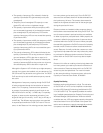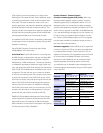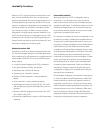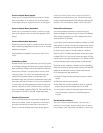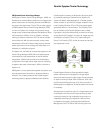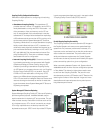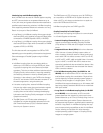be dynamically routed to the z/OS image most capable of
handling the work. This dynamic workload balancing, along
with the capability to have read/write access data from any-
where in the Parallel Sysplex cluster, provides scalability
and availability. When confi gured properly, a Parallel Sys-
plex cluster is designed with no single point of failure and
can provide customers with near continuous application
availability over planned and unplanned outages.
With the introduction of the z10 EC, we have the concept
of n-2 on the hardware as well as the software. The z10 EC
participates in a Sysplex with System z10 BC, System z9,
z990 and z890 only and currently supports z/OS 1.8 and
higher.
For detailed information on IBM’s Parallel Sysplex technol-
ogy, visit our Parallel Sysplex home page at http://www-
03.ibm.com/systems/z/pso/.
Coupling Facility Control Code (CFCC) Level 16
CFCC Level 16 is being made available on the IBM
System z10 EC.
Improved service time with Coupling Facility Duplex-
ing enhancements: Prior to Coupling Facility Control
Code (CFCC) Level 16, System-Managed Coupling
Facility (CF) Structure Duplexing required two duplexing
protocol exchanges to occur synchronously during pro-
cessing of each duplexed structure request. CFCC Level
16 allows one of these protocol exchanges to complete
asynchronously. This allows faster duplexed request ser-
vice time, with more benefi ts when the Coupling Facilities
are further apart, such as in a multi-site Parallel Sysplex
environment.
List notifi cation improvements: Prior to CFCC Level 16,
when a shared queue (subsidiary list) changed state from
empty to non-empty, the CF would notify ALL active con-
nectors. The fi rst one to respond would process the new
message, but when the others tried to do the same, they
would fi nd nothing, incurring additional overhead.
CFCC Level 16 can help improve the effi ciency of coupling
communications for IMS Shared Queue and WebSphere
MQ Shared Queue environments. The Coupling Facility
notifi es only one connector in a sequential fashion. If the
shared queue is processed within a fi xed period of time,
the other connectors do not need to be notifi ed, saving the
cost of the false scheduling. If a shared queue is not read
within the time limit, then the other connectors are notifi ed
as they were prior to CFCC Level 16.
When migrating CF levels, lock, list and cache structure
sizes might need to be increased to support new function.
For example, when you upgrade from CFCC Level 15 to
Level 16 the required size of the structure might increase.
This adjustment can have an impact when the system
allocates structures or copies structures from one coupling
facility to another at different CF levels.
The coupling facility structure sizer tool can size struc-
tures for you and takes into account the amount of space
needed for the current CFCC levels.
Access the tool at: http://www.ibm.com/servers/eserver/
zseries/cfsizer/.
CFCC Level 16 is exclusive to System z10 and is sup-
ported by z/OS and z/VM for guest exploitation.
49



